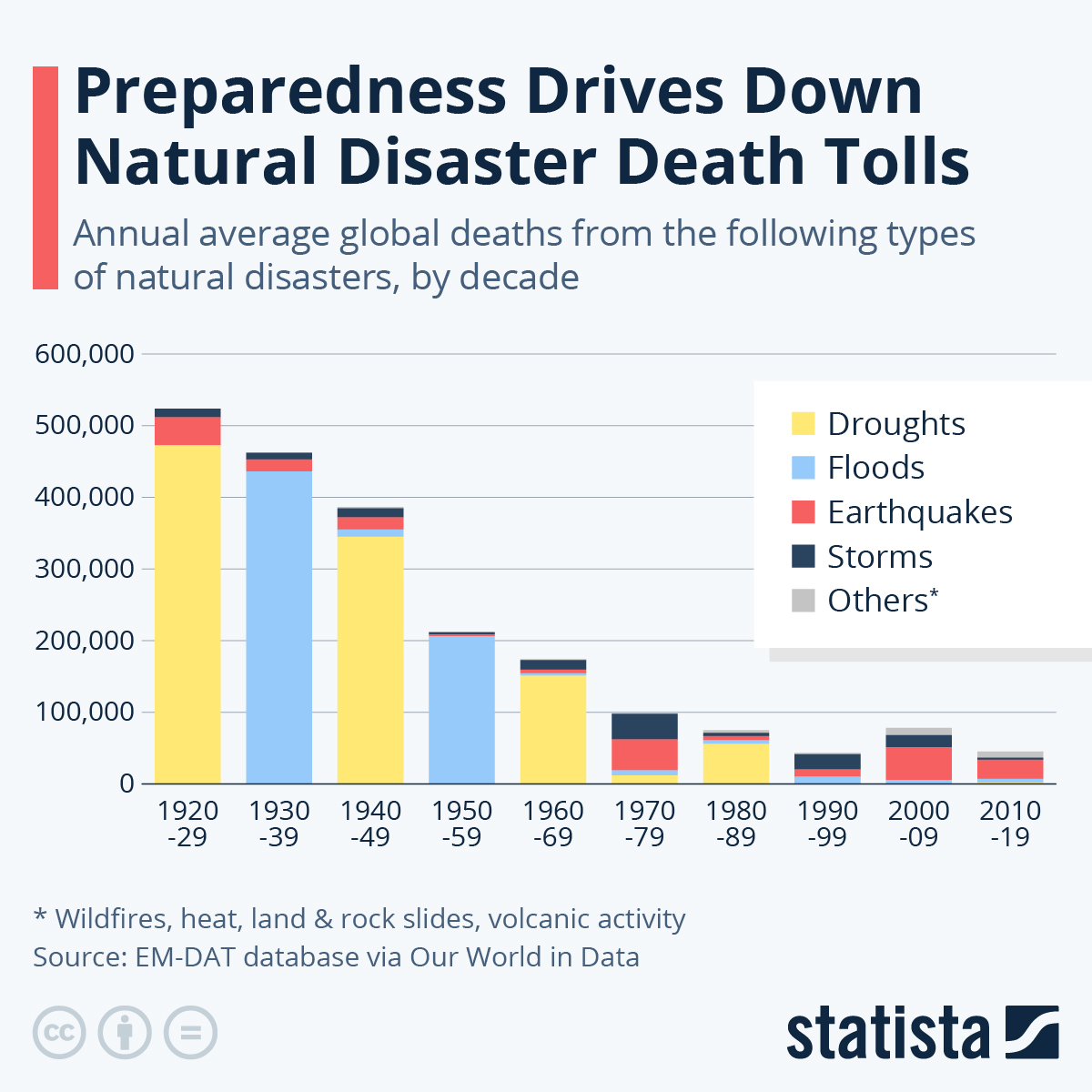I’m personally optimistic given what we’re seeing happening in China in terms of energy transition. China has lots of scientists who must understand what’s happening with the climate, and what to expect. I don’t get the impression that there is nihilism in China like there is in the west, so they must think that this problem will be tractable.
I do expect that we will see a lot of global disasters happening as a result of climate change, and life will get hard around the world as a result. But I also hope that enough of humanity will be able to come together to push through these problems and ensure that our civilization continues.
I don’t think there’s any value in having a fatalistic view on this. We can’t know that we’ll make it, but all we can do is work towards making the world better and hope that what we do will be enough.
I hope that we do.
My primary concern is the Methane Clathrate Gun Hypothesis.
I think it’s unlikely that it will happen, but in short, there is a very real and non-zero chance that a series of massive explosions will trigger globally that may possibly turn Earth instantaneously (at least on the scale of a human life time) into Venus. Billions and billions of tons of methane releases from accelerating global warming that could render life on Earth itself extinct.
If I didn’t think that that global socialism is a guarantee in my life time, I would have offed myself by now.
My mindset is diamond-willpower forged in the core of a neutron star.
No
Nah it’ll be nuclear exchange if anything.
I implore you to not be so pessimistic.
There will be no real socialism for several reasons.
China already exists?
And compare it with the capitalist project :-)
By most metrics i’d give favour to China over comparable projects; China has a 90% house ownership rate in a country of a billion+ people, has a network of high speed rails all over it and subway systems in most major cities.
About China I heard somewhere the opinion that there is half socialism, half capitalism, and not real socialism.
There are always halfway points to devolopment in society; go read ‘Critique of the german ideology’ by Marx, he goes into stages of devolopments.
To call it that would actually be exactly right, minus the ‘real socialism’ bit; My question is how do you build socialism? All at once? Was industrialization built in one motion? Slavery abolished in one step? Of course not, its a project to work towards; China is working towards it. It is ‘real’.
We have started, but how will it all end? Stalin and the USSR also started, but how did it all end? Stalin was poisoned, and the USSR was betrayed and destroyed.
Just because one socialist project collapsed (under intense seige of most global super powers) doesnt mean all are doomed to fail, or not worth pursuing.
The chinese socialist project lives and is thriving, its not in an 80s death spiral like the USSR, its actually pulling ahead of america and is now the biggest economy on the planet due to socialist planning; this enables it to keep wages low due to the fact houses are all owned by the workers.
Like in Shenzen, rent is 80% lower than in London on average; if you imagine how that reduces labour costs, when you dont need to pay rent. It increases competitveness. Shenzhen is also a much nicer city than London.
China can also be betrayed and won in a hybrid war. Everything can change for the worse after a while if the enemies and traitors try hard.
The same premises exists for any other country on the planet, its an empty statement.
You could get hit by a car tomorrow, why try at all?
That’s not how it works. A system cannot be “half socialism half capitalism” as these two concepts quite literally contradict each other.
Socialism is the process of transition from capitalism to communism. It’s defined by a society where the proletariat has become the ruling class, after having the former ruling class overthrown through revolution; a society where the state serves the interests of the workers and naturally withers away (as Lenin puts it) as the concept of class begins to disappear (as we get closer to communism). For more info on this, you can read state and revolution, by Lenin. As for dialectical and historical materialism, you can read Socialism: utopian and scientific, by Engels
Capitalism is the system that came after feudalism and before Socialism. It’s defined by giving full power to the Bourgeoisie and, contrary to under Socialism, the state serves the interests of the Bourgeoisie. It can be split into several stages:
-
Early capitalism (idk the marxist term for it): Trade agreements between bourgeois
-
Monopoly Capitalism: As the nature of Capitalism naturally leads to monopolization, the means of production are at a large scale concentrated in the hands of a few.
-
Imperialism, the highest stage of Capitalism: Capitalism needs infinite growth and expansion to survive, so it exports capital (workers, firms, factories) abroad in order to expand and increase profits.
~My definitions might be slightly incorrect, i haven’t had the time to read theory in a while due to life circumstances~
One could assume China is revisionist for adopting a market economy instead of a strictly planned economy, like the one in the USSR and former Socialist bloc, but this argument is fundamentally wrong, since it’s extremely idealistic to think of Socialism as a fixed set of rules that must be forced upon the material conditions of said society and not the other way around (and that’s why the “not real socialism” argument doesn’t even make any sense). The truth is that, while it’d have been more desirable for China to keep a planned economy, opening up to the West and its capital (under heavy supervision and control of the CPC) allowed China to flourish and become the very industrialized nation that it is today, and I think if Mao could see what his country became, he would be very proud.
-
There will be no real socialism for several reasons.
such as?
Try asking some drug lord to share at least half of his money and power with you. What do you think he or his gang will do to you? :-)
I dont think a drug lord is comperable to a socialist project honestly
I hope so, but think not before global ecological collapse
I wish, but unfortunately I just don’t think that’s possible.
Edit: Downvoters please reply. For clarification, I am just arguing against the claim that climate change will “kill us all” in the literal sense.
Cold weather still kills way more people than hot weather. Warming has decreased the overall temperature-related deaths. 650,000 fewer people die per year than in the 80s and 90s. 18 million die per year from cold weather, 2.2 million from hot weather.
Interestingly, during the 2000-2019 period examined in the study, while heat-related deaths rose, deaths from cold exposure fell. And they decreased by a larger amount than the increase in heat-related fatalities. Overall, researchers estimated that approximately 650,000 fewer people worldwide died from temperature exposure during the 2000-2019 period than in the 1980s and 1990s.
World population has grown (4x) but natural disaster deaths have decreased to a fraction (less than 1/10th or less than 5,000 per year). This is because we are better prepared. A 40+x increase is required to reach 1920 levels per capita. And that 50,000 per year would still not be able to beat the 650,000 fewer people dying from temperature per year.

This is starting to reach the capitalist apologia end of climate change discussion. As long as we can prepare well enough, things won’t get that bad. Kill us all is stretch of course but we shouldn’t just downplay climate change and the disastrous conscequences it will have on the world and our society. Especially considering the people who are responsible for the majority of all pollution are not the people who will face the most direct consequences.
not the most well read dude, but my understanding is that as there is more energy in the atmosphere, there will be more unstable weather patterns - and will lead to crop failures.
this will most likely hit the global south and nations that are less developed (exploited nations such as the global south) harder than the developed nations. people migrating because they can’t live in the deadly heat, or not having enough food, or something about florida going underwater (iirc they won’t insure houses in florida anymore because of global warming and rising sea temperatures.)
edit i don’t think people will want to lay down and die from the inhospitable environment, they will probably move - i don’t think looking at the death toll and saying “see there are less deaths from the climate therefore climate change is not significant” is a good form of analysis, it seems like a bit of a kneejerk reaction, that needs more inspection - like quality of life, crop failures, if you can go outside without heatstroke, these things are gradually ramped up on a scale
I have some friends who live in Florida and, due to work, have to go on the news and say that although Florida is being hit by climate change that it’s still a good place to buy a home. But, privately, they all know that shit is going down and it’s a terrible place to purchase a home.
For any comrades in Florida who expect to live longer than a decade or two, don’t do it.
Changes in the climate might decrease yields, however CO2 concentration directly increases them. This should recover 60% to over 100% (wheat increased, soybean fully recovered) of the losses due to climate change depending on the crop from 2000-2080 according to NASA.
So if you take the 50% loss of corn due to lack of moisture stated in your report, recovered by 60%. It should be ~20% decrease (time period probably starts from 2020s in the report, so this calculation is off), while wheat will increase by 10% overall according to NASA.
Farmers may switch to the more productive crops to compensate.
https://www.nasa.gov/technology/nasa-study-rising-carbon-dioxide-levels-will-help-and-hurt-crops/
Is your perspective that climate change is happening, but we shouldn’t be alarmist over its effects? Asking in good faith comrade.
Yes
I don’t mind taking the study you linked at face value, but I have to ask, taking a step back, why it matters that we don’t be as alarmist over climate change. You agree that it’s man-made and still a problem, from what I understand, but I don’t see a scenario where being alarmist about it to demande real, rapid, effective change is a problem and creates future issues. Less climate change can only be good, I would rather put a stop to temp increases over the next 5 years than slow temp increases in that same timespan, you know what I’m saying?












